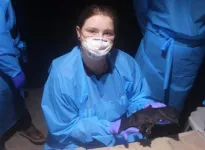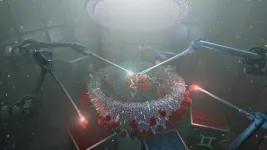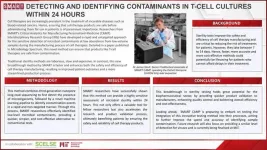(Press-News.org) Vampire bats may soon take up residence in the United States and bring with them an ancient pathogen.
“What we found was that the distribution of vampire bats has moved northward across time due to past climate change, which has corresponded with an increase in rabies cases in many Latin American countries,” said Paige Van de Vuurst, a Ph.D. student in Virginia Tech’s Translational Biology, Medicine, and Health Graduate Program.
Van de Vuurst is the lead author of research recently published in the Ecography journal that predicts that vampire bats — currently only found in Mexico and Central and South America — are on the move with the United States being a viable home in 27 years. The findings concluded that with shifting seasonality — the differences in temperature between the coldest and warmest seasons — vampire bats have expanded their locations in search of more stable, temperate climates.
The research team, which included both undergraduate and graduate students, also found this expanded reach could be linked to a spillover of rabies. Vampire bats are known carriers of rabies, a disease known for its high mortality rates and often considered the oldest pathogen known by humans, dating back 3,000 years.
Latin America is currently feeling the bite of the rabies spread through the loss of livestock, which has generated fear as the bats’ migration patterns expand. The Virginia Tech team aims to vigorously identify and track the bats by traveling to Colombia to help contain the spread to other countries, including the United States and its vital cattle industry.
Why Colombia?
"Colombia is a mega-diverse country, making it a perfect natural laboratory," said Luis Escobar, assistant professor in the Department of Fish and Wildlife Conservation in the College of Natural Resources and Environment. The country boasts having the highest number of hummingbirds and bats, attributed to its tropic climate and proximity to the equator.
Collaborating with three local universities – University of La Salle, Universidad Distrital, and Universidad del Tolima – the collective team traveled all across Colombia to collect more than 70 samples of bat species. This included a range of geographic and climate changes, starting in the hot and humid jungles to cold and cloudy parts of the Andes Mountains that are only accessible by cable car. This allowed the team to secure a variety of samples and observe how changes in climate can change the emergence of diseases in bats.
The team also explored places in Colombia that were previously closed to scientists, including Chaparral, a municipality in the Tolima region that was allowed to start welcoming tourists after the 2016 peace agreement.
The team’s research sought to address a knowledge gap that limits the understanding of the spread of rabies and its spillover from wildlife to humans. Their work had three primary aims:
Determine the role of habitat and virus mutation on rabies spillover to humans and livestock across Latin America
Identify the effect of changes in biodiversity in rabies virus spillover
Investigate geographic and environmental factors influencing the spread of bat-borne
Sinking teeth into the experience
This field experience allowed four undergraduate and two graduate students to travel to Colombia.
“There is a sad reality in wildlife research at the moment that often mandates a ‘pay to play’ mentality, where students must pay for the experience of doing field work, especially international field work,” Van de Vuurst said.
All of the students' expenses, including travel, accommodations, and food, were supported through a National Science Foundation grant, Examining the Geography of Pathogen Spillover, awarded to Escobar, an affiliated faculty member in the Center for Emerging, Zoonotic, and Anthropod-borne Pathogens and the Global Change Center. Van de Vuurst led the team’s campuswide recruitment efforts, yielding 30 interested students from across disciplines.
In advance of the trip to Colombia to study vampire bats, Escobar and his team met near the Duck Pond to review critical safety information and field sampling protocols.
“We selected a truly stellar group of students, and I could not be prouder of them,” said Van de Vuurst.
She was provided an opportunity as an undergraduate to go on an international excursion to Peru. “That trip changed my life, and really opened up the world of ecology for me. I am so glad that we were able to offer that same kind of once in a lifetime research experience to so many students through Luis' hard work and generosity.”
For undergraduate Julia Alexander, it was a series of firsts, including first field experience, first time on a plane, and first time out of the country.
As part of the Escobar Lab’s research staff, Alexander was able to study disease transmission in vampire bats and other local bat species, working with local communities in the Tolima region. It was critically important for Escobar and Van de Vuurst to be able to offer the international research opportunity, knowing that undergraduate students are not usually able to participate in such an experience.
“I not only learned valuable field skills for my career, but also important life lessons from every challenge faced,” Alexander said. “Although this journey was not easy, I wouldn’t exchange the experience for anything else.”
Crossing borders to collaborate
The value of building a network of international collaboration cannot be understated, especially in terms of the commonalities of technology, facilities, and students between Virginia Tech and their international partners.
In fact, Escobar is hosting Diego Soler-Tovar, assistant professor from Universidad La Salle, who will be working in the Escobar lab through late January 2024, to study the drivers of rabies spread in Latin America.
"We all have one goal: generating samples, new data, and new knowledge," Escobar said.
END
Vampire bats make northward flight seeking stable climates
2023-11-27
ELSE PRESS RELEASES FROM THIS DATE:
New method uses crowdsourced feedback to help train robots
2023-11-27
To teach an AI agent a new task, like how to open a kitchen cabinet, researchers often use reinforcement learning — a trial-and-error process where the agent is rewarded for taking actions that get it closer to the goal.
In many instances, a human expert must carefully design a reward function, which is an incentive mechanism that gives the agent motivation to explore. The human expert must iteratively update that reward function as the agent explores and tries different actions. This can be time-consuming, inefficient, ...
Study shows price discounts on healthful foods like vegetables and zero-calorie beverages lead to an increase in consumption of these foods
2023-11-27
Dietary food intake has a major influence on health indicators, including Body Mass Index (BMI), blood pressure, serum cholesterol and glucose. Previous research has shown that decisions to purchase specific food items are primarily based on taste and cost. In the United States, only 12 percent and 10 percent of adults meet fruit and vegetable intake recommendations, respectively. Since affordability of food items is a limiting factor for meeting fruit and vegetable intake guidelines, researchers hypothesize that more affordable low energy-dense foods like fruits and vegetables, which are relatively more expensive ...
New platform solves key problems in targeted drug delivery
2023-11-27
In recent years, cell and gene therapies have shown significant promise for treating cancer, cystic fibrosis, diabetes, heart disease, HIV/AIDS and other difficult-to-treat diseases. But the lack of effective ways to deliver biological treatments into the body has posed a major barrier for bringing these new therapies to the market — and, ultimately, to the patients who need them most.
Now, Northwestern University synthetic biologists have developed a flexible new platform that solves part of this daunting delivery problem. Mimicking natural ...
Schrum and Sleeter unpacking the history of higher education in the United States
2023-11-27
Kelly Schrum, Professor, Higher Education Program; Affiliated Faculty, History and Art History, and Nathan Sleeter, Research Assistant Professor, History and Art History, Roy Rosenzweig Center for History and New Media (RRCHNM), received $220,000 from the National Endowment for the Humanities for the project: "Unpacking the History of Higher Education in the United States."
This funding began in Oct. 2023 and will end in late Dec. 2024.
The history of higher education is central to understanding its present and future, especially for students in Higher Education and Student Affairs (HESA) programs who will lead colleges and universities for decades ...
SwRI-led PUNCH mission advances toward 2025 launch
2023-11-27
SAN ANTONIO — November 27, 2023 —On November 17, 2023, the Polarimeter to UNify the Corona and Heliosphere (PUNCH) mission achieved an important milestone, passing its internal system integration review and clearing the mission to start integrating its four observatories. Southwest Research Institute leads PUNCH, a NASA Small Explorer (SMEX) mission that will integrate understanding of the Sun’s corona, the outer atmosphere visible during total solar eclipses, with the “solar wind” that fills and defines the solar system. SwRI is also building the spacecraft and three of its five instruments.
“This ...
SMART researchers pave the way for faster and safer T-cell therapy through novel contamination-detection method
2023-11-27
Traditional sterility testing methods for the presence of bacteria and fungi in T-cell cultures are time-consuming, taking from seven up to 14 days, while this novel method takes only up to 24 hours
Researchers combined advanced long-read nanopore sequencing techniques and machine learning to ensure accuracy and speed in detecting and identifying sample sterility status and microbial species present in T-cell cultures
This breakthrough has the potential to transform sterility assurance in biopharmaceutical manufacturing, leading to better patient outcomes by accelerating the process of getting ...
AI may spare breast cancer patients unnecessary treatments
2023-11-27
· AI tool could reduce disparities for patients who are diagnosed in community settings
· Non-cancerous cells can play an important role in sustaining or inhibiting cancer growth
· One in eight U.S. women will receive a breast cancer diagnosis in her lifetime
CHICAGO --- A new AI (Artificial Intelligence) tool may make it possible to spare breast cancer patients unnecessary chemotherapy treatments by using a more precise method of predicting their outcomes, reports ...
Characteristics and obtainment methods of firearms used in adolescent school shootings
2023-11-27
About The Study: School shooting incidents in the U.S. were typically executed using low- and moderate-powered firearms, according to this analysis of data from 262 adolescents who discharged firearms in 253 school shootings spanning 26 years. These weapons were most frequently stolen from family members or relatives of the perpetrators. These findings may significantly influence discussions around gun control policy, particularly in advocating for secure firearm storage to reduce adolescents’ access to weapons.
Authors: Brent R. Klein, Ph.D., of the University of South Carolina in Columbia, is the corresponding author.
To access ...
Association of smoking cessation and cardiovascular, cancer, and respiratory mortality
2023-11-27
About The Study: Excess cardiovascular mortality among former smokers was about one-third that of continuing smokers within the first decade after quitting, and the cardiovascular mortality rate of former smokers was similar to that of never smokers 20 to 29 years after quitting in this study of 438,000 U.S. adults. These findings emphasize that with sustained cessation, cause-specific mortality rates among former smokers may eventually approximate those of never smokers.
Authors: Blake Thomson, D.Phil., of the Stanford University School of Medicine in Stanford, California, is the corresponding author.
To access the embargoed study: Visit our For The Media website at ...
Brain boost: Can a coach help elders at risk for Alzheimer’s?
2023-11-27
Brain Boost: Can a Coach Help Elders at Risk for Alzheimer’s?
Study shows cognitive improvements when participants keep active and socially engaged, control blood pressure and diabetes.
As more medications move towards federal approval for Alzheimer’s disease, a new study led by researchers at UC San Francisco and Kaiser Permanente Washington has found that personalized health and lifestyle changes can delay or even prevent memory loss for higher-risk older adults.
The two-year study compared cognitive ...





